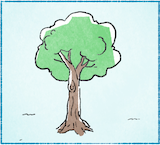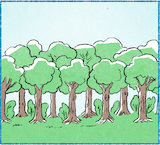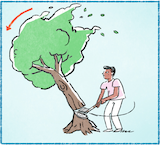


นี้คืออี่หยัง อันนี้คือต้นไม้ อันนี้เป็นต้นไม้
มีต้นเดียวข้อหล้อ เกิดอยู่ต้นเดียวข้อหล้อ
ต้นไม้นี้กะมีส่วนปะกอบหลายสิ่งหลายอย่าง แต่ละอย่างนั้นกะสิแตกต่างกันออกไป มีใบพ้อม มีกิ่งก้านพ้อม มีลำต้นพ้อม มีฮากมันพ้อม
7
อันนี้คืออี่หยัง อันนี้เป็นป่า เป็นป่าไม้ป่าไหล้
แต่ว่าขั้นอยู่พากอี่สาน หลืออยู่อี่สานนี้ กะสิเอิ้นว่าโคก
ป่าใหญ่ๆ ที่มันเป็นป่าใหญ่ๆ กะสิเอิ้นว่าโคก
ป่าหลือโคกนี้มีปะโยดจั่งใด กะมีปะโยดหลายเติบ มีปะโยดคัก เพาะว่าในป่านั้นสิมีต้นไม้ มีหญ้ามีเอ่ย มีหลายสิ่งหลายอย่างที่อยู่ในหั้น แล้วกะเป็นหม้องอาสัยของสัดต่างๆ แล้วกะซ่อยเฮ็ดให้โลกเป็นตาอยู่พ้อม เฮ็ดให้โลกบ่ฮ้อน ขั้นโลกนี้บ่มีต้นไม้ โลกกะสิฮ้อน โลกกะสิบ่เป็นตาอยู่
8
เขากำลังเฮ็ดหญัง เขากำลังตัดต้นไม้ หลือฮานต้นไม้นั้นหละ
เขาฮานไปเฮ็ดหญัง อันนี้กะบ่ฮู้คือกัน จักว่าเขาสิเอาไปเฮ็ดหญัง เขาอาดสิเอาไปเฮ็ดก่อส้าง หลือเฮ็ดบ้านเฮ็ดเอ่ยเฮ็ดอี่หยังกะได้
ไม้นี้สามาดเฮ็ดอี่หยังได้แน่ กะเฮ็ดได้หลายอย่าง เฮ็ดบ้านกะได้ เฮ็ดเถียงนากะได้ เฮ็ดฮั้วบ้านกะได้ เฮ็ดเฟอนิเจอกะได้
เขาใซ้อี่หยังตัดต้นไม้ เขาใซ้อี่หยังฮานต้นไม้ เขาใซ้ขวน อันนี้คือเอิ้นว่าขวน ขวนเป็นค้ายๆ กับมีด แต่ว่ามันสิแข็งแลงทนทานกว่ามีด มันสิสามาดตัดต้นไม้ง่ายๆ ได้
Link to overview page
Link to dictionary
| Isaan | Pronunciation | Tones | Thai | English/Notes |
|---|---|---|---|---|
| นี้ | ni: | HF | นี้ | 1. this 2. here |
| คือ | khʉ: | HR | คือ | 1. to be, to resemble, like, as 2. why {บักหล้าคือบ่เก็บโต่ะแน่ = [addressing a young boy] Why haven't you cleared the table?} |
| อี่หยัง | i:-yaŋ | H-M | อะไร | 1. what {นี้คืออี่หยัง = What is this?} {มื้อนี้เจ้าเฮ็ดอี่หยัง = What are you doing today?} {กินเข้างายกับอี่หยัง = What did you have for breakfast?} 2. something, anything, (in negations) nothing {บ่ต้องเฮ็ดอี่หยังอีกเลยนอกจากใส่ปุย = [we] don't need to do anything besides adding fertilizer} |
| อัน | an | M | อัน | 1. thing, object 2. general clf. for objects |
| ต้นไม้ | ton-mai | HF-HF | ต้นไม้ | tree |
| เป็น | pen | M | เป็น | 1. to be, to exist 2. to be able to 3. to suffer, sth. happens to 4. เป็นหญัง[...]คือ in initial position: why? {เป็นหญังเขากะคือแปงฟัน = Why is he brushing his teeth?} {เป็นหญังเคี่ยงบินมันคือสิตก = Why is the airplane falling down?} |
| มี | mi: | HR | มี | 1. to have 2. there is |
| ต้น | ton | HF | ต้น | 1. clf. for trees, plants, logs/pieces of wood {ต้นไม้ต้นใหญ่ = a large tree} {ต้นฟืน = log/piece of wood} 2. first, primary, initial {ลูกคนต้นหมู่ = first child} |
| เดียว | di:ao | M | เดียว | only, alone, single |
| ข้อหล้อ | khɔ:-lɔ: | LF-LF | เท่านั้น, ขนาดนั้น, น้อยๆ | only {ต้นไม้มีต้นเดียว ต้นเดียวข้อหล้อ = there's one tree, only one tree} {มีบ้านหลังเดียวข้อหล้อ = there's only one house} |
| เกิด | gə:t | LF | เกิด | 1. (often together with ขึ้น) to happen, to arise, to take place {เกิดอี่หยังขึ้น = what is happening?} {บ่มีหญังเกิดขึ้น = nothing's happening} 2. to be born 3. to grow {หนวดกะคือสิเกิดอยู่ใต้ดัง = a moustache grows below the nose} |
| อยู่ | yu: | H | อยู่ | 1. to be (located) at 2. yet, still 3. auxiliary indicating continuous or progressive action {ทอดปาอยู่ในกะทะ = (in the process of) frying a fish in the pan} {แม่กำลังเมี้ยนเฮียนอยู่ = mother is cleaning/tidying up the house} |
| กะ | ga | M | ก็ | 1. then, consequently 2. also |
| ส่วนปะกอบ | su:an-pa-gɔ:p | H-M-LF | ส่วนประกอบ | component, element |
| หลายสิ่งหลายอย่าง | la:i-siŋ-la:i-ya:ŋ | M-H-M-H | หลากหลาย, มากมาย, หลายอย่าง | varied, various, several (kinds etc.) |
| แต่ละ | tɛ:-la | H-H | แต่ละ | each {มือแต่ละข้างกะสิมีห้านิ้ว = each hand has five fingers} {แต่ละมื้อๆ = each day} |
| อย่าง | ya:ŋ | H | อย่าง | type, kind, sort, category |
| นั้น | nan | HF | นั้น | that, there |
| สิ | si | M | จะ | future tense auxiliary {เขากำลังสิตื่น = he's about to wake up} {สิไปตะหลาด = [I'm] going to the market} |
| แตกต่าง | tɛ:k-ta:ŋ | LF-H | แตกต่าง | different, dissimilar |
| กัน | gan | M | กัน | mutual, each other, with another, together {เขากำลังนั่งเว้ากัน = they're sitting and talking} {เขาสองคนฮักกัน = they love each other} {ปาสองโตนี้ ใหญ่ห่างกันหลายบ่ = These two fish here, are they very different in size (from each other)?} {ต่างกัน = to be different (from each other)} {ก่องอันไหนหนักกว่ากัน = Which box is heavier (than the other(s))?} |
| ออก | ɔ:k | LF | ออก | 1. to go out, to leave 2. out |
| ไป | pai | M | ไป | 1. to go 2. auxiliary indicating action extending into the future |
| ใบ | bai | M | ใบ | 1. leaf {ต้นไม้มีใบสีเขียว = the tree has green leaves} 2. banknote {เทิงมีใบพ้อม เทิงมีเหลียนพ้อม = there are notes as well as coins} 3. clf. for leaves, bank notes, helmets, bowls, jars, pots, boxes {ใบบัว = lotus leaf} {ก่องใบน้อย = a small box} {หม้อใบนี้มีฝาพ้อม = the pot here has a lid, too} {ถ้วยใบสีแดง = a red bowl} |
| พ้อม | phɔ:m | HF | พร้อม | at the same time, also, too {มีตะเว็นพ้อม = the sun's out, too} {กะทะมีด้ามพ้อม = the pan has also a handle} |
| กิ่ง | giŋ | H | กิ่ง | branch, twig |
| ก้าน | ga:n | HF | ก้าน | stem, stalk, branch |
| ลำต้น | lam-ton | HR-HF | ลำต้น | trunk, stem |
| ฮาก | ha:k | HF | ราก | root |
| มัน | man | HR | มัน | it (also used to refer to people) |
| ป่า | pa: | H | ป่า | forest |
| ป่าไม้ | pa:-mai | H-HF | ป่าไม้ | forest |
| ไหล้ | lai | LF | used in semantic reduplications {ทุ่งหญ้าทุ่งไหล้ = grass meadows [and such]} {ป่าไม้ป่าไหล้ = forests [and such]} | |
| แต่ว่า | tɛ:-wa: | H-H | แต่ว่า | 1. but 2. only {ฮู้แต่ว่าเขายืนอยู่พุเดียว = I only know that he's standing there by himself} |
| ขั้น | khan | LF | เมื่อ | when, if |
| พาก | pha:k | HF | ภาค | part {พากอี่สาน = Isaan (as a region)} {พากกาง = Central Thailand} |
| อี่สาน | i:-sa:n | H-M | อีสาน | Isaan {คนอี่สาน = Isaan person} |
| หลือ | lʉ: | M | หรือ | or |
| เอิ้น | ə:n | HF | พูด, เรียก | to call, to say {เอิ้นง่ายๆ ว่า = in other words} {คนอี่สานเอิ้นว่า เป็นลูกคนกก = Isaan people call her ลูกคนกก} |
| ว่า | wa: | H | ว่า | 1. that, as {คำว่า X = the word X} 2. to say |
| โคก | kho:k | HF | ป่าไม้ | forest, woods |
| ใหญ่ | ɲai | H | ใหญ่ | large, big |
| ที่ | thi: | H | ที่ | 1. that, which {คนที่ยืนอยู่ฝั่งขวา = the person which is standing on the right = the person standing on the right} {เว้าคำที่บ่สุพาบ = to speak words which are impolite = to speak impolitely} 2. for ordinal numbers {ที่สาม = third} |
| ปะโยด | pa-yo:t | M-LF | ประโยชน์ | 1. benefit 2. useful |
| จั่งใด | jaŋ-dai | H-M | ยังไง, แบบไหน | how, in what manner {บักนาวมันมีลดซาดจั่งใด = Lime fruits have what kind of taste?} {เขาปิดแอจั่งใด = How is he switching off the A/C?} {เทียนใซ้จั่งใด = How's a candle used?} {สิใซ้จั่งใด = how is [it] used?} |
| หลายเติบ | la:i-tə:p | M-LF | many, much, very (more intense than หลาย) | |
| คัก | khak | H | intensifier: very, very much | |
| เพาะว่า | phɔ-wa: | H-H | เพราะว่า | because |
| ใน | nai | HR | ใน | in, within |
| หญ้า | ɲa: | LF | หญ้า | grass |
| เอ่ย | ə:i | H | generic term in reduplications, e.g., เด็กน้อยเด็กเอ่ย, เป็นแผเป็นเอ่ย, เฮ็ดตาเฮ็ดเอ่ย, มีหญ้ามีเอ่ย, เฮ็ดบ้านเฮ็ดเอ่ย | |
| หั้น | han | LF | ที่นั่น | there, over there |
| แล้ว | lɛ:o | HF | แล้ว | 1. finished 2. already 3. and then, and next (especially แล้วกะ) 4. auxiliary for past tense |
| หม้อง | mɔŋ | LF | ที่, แห่ง, บริเวณ | 1. place, area {หลายที่หลายหม้อง = in many places} {หม้องใดหม้องหนึ่ง = some place} 2. clf. for places |
| อาสัย | a:-sai | M-M | อาศัย | 1. to live, to reside, to settle {ซ้างมันอาสัยอยู่ใส = Where do elephants live?} 2. to use |
| ของ | khɔ:ŋ | M | ของ | of, belonging to |
| สัด | sat | M | สัตว์ | animal |
| ต่างๆ | ta:ŋ-ta:ŋ | H-H | ต่างๆ | different, various |
| ซ่อย | sɔ:i | H | ช่วย | to help, to assist {ขอบใจเด้อที่มาซ่อย = Many thanks for your help!} |
| เฮ็ด | het | H | ทำ | to do, to make |
| ให้ | hai | LF | ให้ | 1. to give {หมอกำลังเอายาให้คนป่วยกิน = the doctor is giving the patient medicine} 2. for 3. to allow, to be allowed |
| โลก | lo:k | HF | โลก | world, earth |
| ตา | ta: | M | ตา | as a prefix: likely, worthy, fit for (like Thai น่า-) {ตาฮัก = lovely/cute} {ตาสะออน = praiseworthy} {ตาหวาน = (of ice cream) [likely to be] sweet} {ตาอยู่ = to be a good place to be} Notes: see also various entries for ตา-, e.g., ตาแซบ, ตาพู่ฮ้าย, ตาย้าน, ตาอยากหัว, ตาฮัก, ตามีแฮง |
| บ่ | bɔ: | H | ไม่ | 1. no, not 2. question particle, transforming a statement into a question Notes: spelling exception in line with common usage on social media |
| ฮ้อน | hɔ:n | HF | ร้อน | hot |
| เขา | khao | M | เขา | personal pronoun: he, she |
| กำลัง | gam-laŋ | M-HR | กำลัง | auxiliary indicating continuous or progressive action |
| หญัง | ɲaŋ | M | อะไร, เป็นหญัง = ทำไม | 1. what {เขากำลังเฮ็ดหญัง = What is he doing?} {ธูปเอาไว้เฮ็ดหญัง = What are incense sticks for?} 2. something, anything, (nothing) 3. เป็นหญัง[...]คือ in initial position: why {เป็นหญังเขาคือใส่บักพิกลงไปในกวยเตียว = Why is he putting chili in [his] noodle soup?} {เป็นหญังหน้าต่างมันคือเปิด = Why is the window open?} {เป็นหญังมันคือมีควนไฟ = Why is there smoke?} |
| ตัด | tat | M | ตัด | to cut {ตัดผม = to cut hair} |
| ฮาน | ha:n | HR | ตัดต้นไม้ใหญ่, ตัดกิ่งไม้ | to cut down a tree, to cut down branches of a tree |
| นั้นหละ | nan-la | HF-M | นั่นแหละ | auxiliary for emphasis at the end of a phrase |
| ฮู้ | hu: | HF | รู้ | 1. to know 2. to understand Notes: equivalent to ลู้ |
| คือกัน | khʉ:-gan | HR-M | เหมือนกัน | 1. also, likewise, similarly {ยินดีที่ได้ฮู้จักคือกันคับ = Nice to meet you too!} 2. in negative sentences: either {บ่ลู้คือกัน = I don't know either} {จักคือกัน = I don't know (either)} |
| จัก | jak | M | จัก | 1. answer to a question: [I] don't know, don't know exactly, [I'm] not sure {พุซายคนนี้เขาเถ้าไป่ จัก จักเถ้าหลือบ่เถ้า เบิ่งบ่ค่อยออก = Is this man here already old? I don't know. I can't see clearly whether he's old or not.} {เขาเว้ากันอยู่ใส จักคือกัน = Where are they talking? I don't know either.} 2. exact(ly), what exactly {จักต้มอี่หยังกะบ่ฮู้ = I don't know what (exactly) he is cooking} {บ่ลู้คือกันจักปาอี่หยัง = I don't know either what kind of fish this is} 3. how much/many? {ต้นไม้มีจักต้น = How many trees are there?} {ตอนนี้จักโมงแล้ว = What time is it now?} {มือของเฮานี้สิมีจักนิ้ว = How many fingers do our hands have?} 4. a bit, a little bit {จักหน่อย/จักหน่อยหนึ่ง = a bit, a little bit} |
| เอา | ao | M | เอา | to take, to give {เขากำลังเอาก่องไปซั่ง = he's taking the boxes to weigh them} {หมอกำลังเอายาให้คนป่วยกิน = the doctor is giving medicine to the patient} {เอาไว้ถ้า = is for, is used for, has the purpose of} |
| อาด | a:t | LF | อาจ | 1. might, may, will 2. likely |
| ก่อส้าง | gɔ:-sa:ŋ | H-LF | ก่อสร้าง | to construct, to build |
| บ้าน | ba:n | HF | บ้าน | 1. house, home 2. village (also used as a prefix before the name of a village) 3. home country, home region {บ้านเฮาเฮ็ดเข้าจั่งใด = How do we plant rice in Isaan/Thailand?} |
| ได้ | dai | HF | ได้ | 1. can 2. to get, to obtain 3. before verb: indicating past tense 4. บ่ได้ + verb: not |
| ไม้ | mai | HF | ไม้ | wood, tree |
| สามาด | sa:-ma:t | M-HF | สามารถ | can, to be able |
| แน่ | nɛ: | H | แน่, บ้าง | 1. some, somewhat 2. final particle, used to ask for examples (similar to Thai บ้าง at the end of a question) {หม้อใซ้เฮ็ดอี่หยังได้แน่ = What (different things) can a pot be used for?} {น้ำอัดลมซื้อได้อยู่ใสแน่ = Where/in which places can one buy soft drinks?} 3. final particle, when giving examples {มีเทิงส้งแน่ มีเสี้ยแน่ มีเกิบแน่ = there are trousers, shirts, shoes etc.} 4. final particle, used to give a command {ไปปิดหน้าต่างให้แน่ = Close the window!} 5. final particle, acting as an intensifier, especially in the pattern ... คัก ... แน่ {สูงคักสูงแน่ = very high} {ญ้องเฮาคัก ญ้องเฮาแน่ = [he's] praising me a lot} |
| หลาย | la:i | M | เยอะ, มาก | many, much, very |
| เถียง | thi:aŋ | M | เถียง | temporary hut in the rice field |
| นา | na: | HR | นา | rice field |
| ฮั้ว | hu:a | HF | รั้ว | 1. fence 2. wall |
| เฟอนิเจอ | fə:-ni-jə: | HR-H-M | เฟอร์นิเจอร์ | furniture |
| ใซ้ | sai | HF | ใช้ | to use |
| ขวน | khu:an | M | ขวาน | axe, hatchet |
| ค้าย | kha:i | HF | คล้าย | to resemble, to be similar, to be alike {ทัพพีเป็นค้ายๆ กับซ้อน = a ladle is similar to a spoon} |
| กับ | gap | M | กับ | 1. and {ลุงกับป้า = uncle and aunt} {กวยเตียวหมูกับกวยเตียวไก่ = noodle soup with pork and noodle soup with chicken} 2. with, to {ค้ายๆ กับคำว่า ... = similar to the word ...} 3. prefix in front of foods {กับเข้า = side dishes eaten with rice} {เขากินกับกวยเตียว = he's eating noodle soup} |
| มีด | mi:t | HF | มีด | knife |
| แข็งแลง | khɛŋ-lɛ:ŋ | M-HR | แข็งแรง | strong, healthy, robust |
| ทนทาน | thon-tha:n | HR-HR | ทนทาน | durable, lasting |
| กว่า | gwa: | H | กว่า | more, more than, comparative: as, than |
| ง่าย | ŋa:i | H | ง่าย | easy, simple, clear |